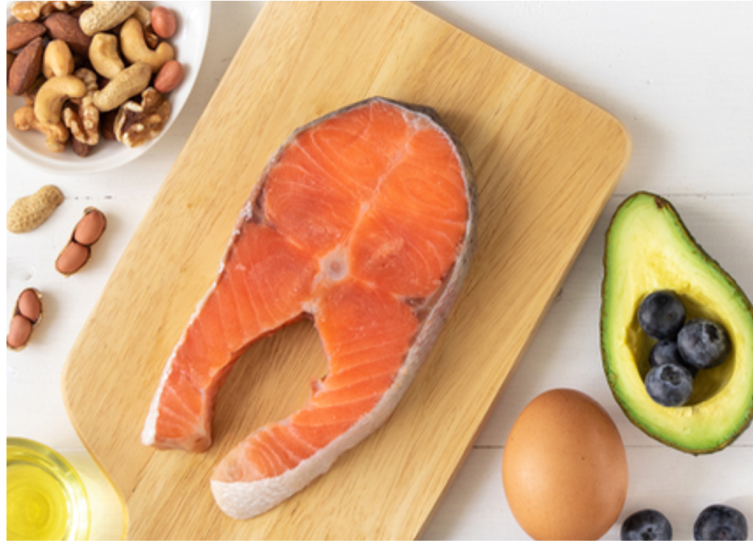Ketosis is not just about eating less carbohydrates and more fats. The real trick is how to make our bodies burn fats continuously and effectively to provide us with energy.
As the weather gets warmer, it’s time to start wearing beautiful clothes again. Let’s summarize the most common mistakes in ketosis to avoid wasting our efforts.
- Not eating enough monounsaturated fats
Increasing fats in ketosis doesn’t mean any fats will do. The best fats are monounsaturated fats, which can enhance insulin sensitivity, lose weight, and prevent cardiovascular diseases.
Simply replace the oil at home with olive oil to easily increase the intake of monounsaturated fats. - Continuing the ketogenic diet without a rest period
After a long time on the ketogenic diet, it is inevitable to develop glucose intolerance. The body gets used to using fat for energy and becomes a little confused about carbohydrates.
In order to allow the body to function effectively, enhance metabolism, and avoid glucose intolerance, it is necessary to give the ketogenic diet a break occasionally. For example, every three months, stop the ketogenic diet for one to two weeks and consume healthy carbohydrates. - Fear of protein
We have been told that eating too much protein will make ketones go away. This statement is based on a 2016 study, but with the continuous popularity of ketosis, more studies have shown that protein does not make ketones go away.
In addition, to a certain extent, eating more protein is better than eating more fats, because protein does not turn into fat. For those who want to lose weight but can’t control their appetite, it’s better to eat more protein to satisfy their cravings. - Not getting enough fiber
Fiber can help regulate the intestines. If it is a pure meat diet, there is no need for fiber. If it is a ketogenic diet, fiber can better metabolize fat and protein.
- Not paying attention to glucose levels
Keto hosts have been diligent in monitoring their ketone levels. Rather than monitoring ketones, it is more important to monitor glucose levels. Glucose is closely related to insulin. When glucose rises, insulin rises, and the generation of ketones will naturally be affected.
So when monitoring ketones, also test the glucose level along the way, and get twice the result with half the effort.
- Consuming too much saturated fat
Saturated fat is not bad, but its nutritional content is not as good as that of monounsaturated fat and polyunsaturated fat.
We try to keep saturated fat under 20% of all fat intake, and leave the rest of the space for other fats with better nutrition.
- Not occasionally supplementing carbohydrates before exercise
Once or twice a week, eat an apple before exercise and supplement some carbohydrates, which can promote the body’s ability to metabolize carbohydrates and can also enhance athletic ability. The carbohydrate here is basically the amount of an apple, not a large piece of cake or bread.
Miss Karin will also learn and experiment later. I basically go to exercise when I fast for more than ten hours, and I only have a cup of black coffee before exercise. After the experiment, I will share my experience with you.
- Fear of fruits
When they hear about fruits, everyone is afraid and thinks that they can’t even touch them. In fact, the carbohydrates in berries such as strawberries, blueberries, and blackberries are very low. You can control the amount you eat. Can you eat fruits? A picture will show you how to eat without bursting carbs.
Miss Karin sometimes eats blueberries with Greek yogurt as a dessert after a meal.
- Not getting enough electrolytes
The biggest fear of a ketogenic diet is the lack of electrolytes. Due to low carbohydrates, the insulin level is low, and the body will lose electrolytes such as salt and other trace elements.
Appropriate additional supplementation of electrolytes will make the body feel more comfortable. Now when I exercise, I will bring electrolyte powder and drink it with water. Even with high-intensity exercise, my body doesn’t feel very tired.
- Not controlling calories
Although the ketogenic diet is not a diet, it does not emphasize calories so much, but you cannot eat without restraint.
Excess calories that cannot be metabolized will be stored as fat. The most important thing is that each of us must know our own calorie intake value. This can only be explored by ourselves. If you exceed this calorie, you will gain weight.
- Non-stop eating
There should be an interval between meals, and it is best to finish all the food within a specified time period. Even if you don’t fast, there should be a watershed, such as not eating after 6 o’clock every day.
Non-stop eating will keep insulin levels high, and even fat will cause insulin fluctuations. So don’t eat from opening your eyes to closing your eyes.
- Ignore triglycerides
Regularly check the triglyceride index. If the index is too high, it may indicate that the body cannot effectively metabolize fat, that is, it may not be suitable for the ketogenic diet.
Check it out and listen to what the doctor says.

Average Rating